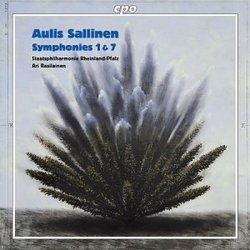The Beginning of an Important New Sallinen Series
J Scott Morrison | Middlebury VT, USA | 12/24/2003
(5 out of 5 stars)
"When setting out to write a review of this disc I've been a bit daunted because I keep finding more things to admire. I consider Aulis Sallinen (b. 1935) to be, with Rautavaara, one of the great living Finnish composers. His voice is almost instantly recognizable and it speaks directly to me with its ceremonial solemnity mixed with mastery of impressionistic and magical orchestration. His music is obviously influenced by that of his Finnish predecessor, Sibelius. Although completely tonal it does not tend to partake of the faux-medieval religiosity of some other Baltic or Scandinavian composers; this is music of the present. Still, it frequently has a mythic quality. This disc, containing four works--two of them [Solemn Overture; Seventh Symphony] unfamiliar to me--helps confirm the impression of greatness. Added to that are the marvelous performances by the Staatsphilharmonie Rheinland-Pfalz led by Ari Rasilainen under the direct supervision of the composer. Rasilainen had been known to me for his significant series of excellent recordings of the orchestral music of Kurt Atterberg. He and his orchestra do not disappoint here.The first and last pieces on the disc are the most recently composed. 'A Solemn Overture (King Lear)', Op. 75 and the Seventh Symphony date from the late 1990s. The Overture, a recomposition of music from his latest opera, 'King Lear,' is an eleven-minute piece not specifically intended as a preface to the opera itself. It is based on four themes, the first three of which are harmonically related. Each theme is played twice during the composition. The thematic argument is interrupted repeatedly by a fanfare figure. Fittingly, the overall tone, as in the opera, is inexorably tragic. The 25-minute, one-movement Seventh Symphony started life as music for a never-realized ballet based on Tolkien's 'The Hobbit,' hence its subtitle, 'The Dreams of Gandalf.' It does not depict specific events in the story but intends to evoke, according to the composer, 'the reading experience and transfers the literary atmosphere and poetry into a musical expression.' Generally the harmonic language is more advanced--sometimes even congested and portentous--than in earlier music by Sallinen, but there is also the quasi-medieval use of dancing Provençal flute and drum (galoubet-tambourin). Sallinen also says that he makes use some medieval Finnish folksongs. The composer's magical use of shimmering harp and tuned percussion is also very much in evidence.The 14-minute, one-movement First Symphony, written in about 1970, already has the composer's unmistakable fingerprints. Using a Sibelian method of organic development of tiny motifs there is, for the first time in his music so far as I know, the use of bells, so typical of Sallinen's work, against flashes of piccolo, trudging lower strings, upper string interjections, harp, intoning brass. This characteristic combination appears again and again in later Sallinen--most effectively in the Fifth Symphony where it is within the context of independently moving, dreamlike planes of sonority--and is, for me, intensely evocative.Still one of my favorite of all of Sallinen's orchestral works is his eleven-minute, one-movement'Chorali' ['Chorales'; 1971]. It was given a spectacular reading by Paavo Berglund and the Helsinki Philharmonic on a BIS recording that also contained the First Symphony. I think the present recording, a couple of minutes shorter than Berglund's, makes an even better case for this composition. For wind and percussion ensemble, it occupies the same sound world as Rautavaara's 'Cantus Articus,' which it antedates. Indeed, the main theme (an Ohrwurm if there ever was one) is a striking oboe figure (falling third, falling fourth--C A B-flat F) that is eerily similar to the plaintive birdcall in that latter piece. Moving slowly, dreamily, this work is a wind-band masterpiece. It is no wonder it has been taken up by many such groups the world over. The recorded sound is excellent, the Staatsphilharmonie Rheinland-Pfalz, not always the most suave group, plays expertly here. I have great hopes for this ongoing series and will eagerly await subsequent issues.Strongest recommendation.Scott Morrison"

